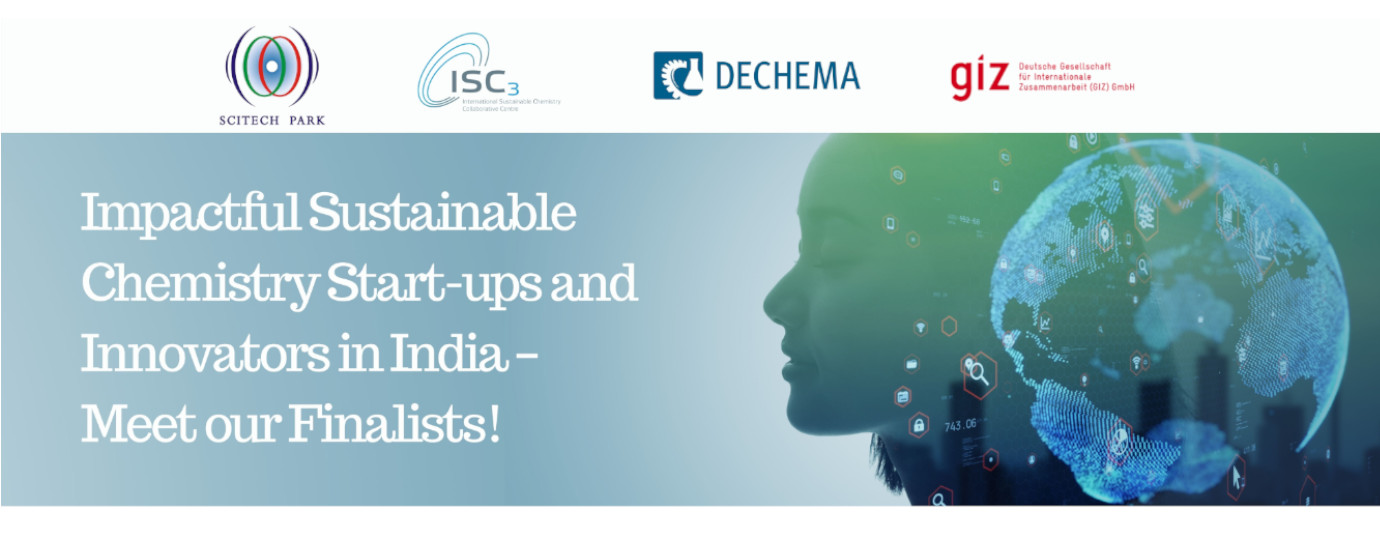Press Release Finalists ISC3 Start-up Call India
Impactful Sustainable Chemistry Start-ups and Innovators in India – Meet our Finalists!
Pune/India and Frankfurt am Main/Germany, May 11th, 2022 – The voting period of the Call to Impactful Sustainable Chemistry Start-ups and Innovators in India just ended and the ISC3 is introducing the ten finalists.

By developing sustainable products, processes, and business models start-ups in the field of Sustainable Chemistry play a key role in enabling a liveable future and achieving the United Nations Sustainable Development Goals (SDGs). The new designs and innovations in chemistry need to provide desirable functions and services of chemicals, materials, products, and production processes without causing harm to human health and the environment.
In this context SciTech Park Pune and the International Sustainable Chemistry Collaborative Centre (ISC3) were looking for start-ups which align with one or more of UNEP’s Ten Objectives for Green and Sustainable Chemistry* to be seen as international shining examples for a sustainable transformation of a whole industry. The ten finalists have now the opportunity to showcase their innovation in the framework of “the Sustainable Chemistry Club” webinar series in front of Sustainable Chemistry Stakeholders and during theISC3 Investor Forum 2022 as part of the ISC3 Global Start-up Service's Personalised Support!
The following ten start-ups made it through to the finals (alphabetic order):
*The designations employed in the presentation of this material and the views expressed with regards to UNEPs Green and Sustainable Chemistry Objectives do not necessarily represent the views or stated policy of the United Nations Environment Programme. Moreover, the presence of the below companies alongside The Ten Objectives and Guiding Considerations for Green and Sustainable Chemistry does not in any way constitute endorsement by UNEP*.
Alver World; Vladas Snieckus:
Alver World has created a microalgae cultivation technology, which allows to achieve nutrient rich algae cells, packed with vitamins, minerals, proteins and other nutrients. Algae are an ideal addition to a healthy diet due to their exceptional micro-nutritional values and high protein content, ideal for those striving for an animal protein-free diet.
Ashaya; Anish Malpani:
Ashaya is a social enterprise that aims to increase the value of waste through recycling and fairly redistribute that value to stakeholders in the supply chain, especially those who are the poorest: waste-pickers. Through chemo-mechanically recycling metalized multi-layered plastic packaging waste, Ashaya creates high-quality materials and products. This is achieved by the use of reactive extrusion and chemical depolymerization.
Coco Custo; Shaan Lalwani:
Coco Custo produces cleaning products, for laundry, dishes and surfaces. Their sustainable products perform as well as or better than the ones they replace. As the products are scientifically formulated from non-toxic, 100% biodegradable ingredients and made from certified organic oils, Coco Custo enables a non-toxic circularity.
E[co]work; Deepali Sinha Khetriwal:
E[co]work is a unique solution to a complex problem: the gap between informal e-waste dismantlers and sound recycling practices. Dismal working conditions and unscientific methods are dangerous and polluting. E[co]work takes the idea of a co-working space and adapts it for the e-waste recycling sector. In addition to the physical infrastructure with safe tools, secure storage and pay-as you-go model, a digital platform connects materials to markets helping to further circularity.
Help Us Green LLP; Karan Rastogi:
Help Us Green is a social enterprise that collects flower waste from the places of worship and convert them into incense sticks and colours with the help of underprivileged women creating a perfect example of circular economy in India. Thereby Help Us Green “flower cycles” 2.4 tons of flowers everyday with the help of 43 rural women.
MiniMines Cleantech solution; Anupam Kumar:
MiniMines technology comprises a low cost, closed loop environmentally sustainable process for battery recycling. The process uses aqueous solution, allows high conversion efficiency of electrode materials (≥ 97-99%), creates no wastewater (solidwaste (≤ 0.5 %)), has low energy consumption and zero emission of harmful gases.
Proklean Technologies Pvt. Ltd; Karthikeyan K.S:
Proklean Technologies’ proprietary probiotics-based technology uses the power of beneficial microorganisms to produce high performing biochemicals in a low impact process. Their manufacturing (fermentation) process is unique with extremely low energy consumption,no effluent generation and is completely safe for the employees in manufacturing as well as for all users of the products. In that way, Proklean Technologies’ innovation has helped many customers to reduce or eliminate use of toxic and hazardous chemicals.
REVY Environmental Solution; Vanita Prasad:
REVY is currently implementing optimized wastewater treatment technology. With its biotechnological approach, REVY helps provide clean water and sanitation, as well as affordable and clean energy to communities that want to become more climate-smart. Beyond this, with its comprehensive microbial bank, REVY is able to supply commercially viable and cost-effective fertilizer, biogas, and waste treatment solutions.
SCHUTZEN; Raj Mahendra Tanna:
SCHUTZEN is a diversified specialty chemicals manufacturer focused on replacing unsustainable chemical formulations, products, processes and ingredients across textile specialty chemicals, personal care chemicals, paint and coatings. As a raw material for almost all their innovations, SCHUTZEN uses abundantly available bio-waste from the seeds of the tamarind fruits.
Vriddhijal Agri Technologies; Amit Kumar Gupta:
Vriddhijal Agri Technologies produces an organic liquid fertilizer solution for Indian farmers. The organic liquid fertilizer allows to minimize the incidence of pest and diseases, improves water holding capacity and prevents soil erosion. Furthermore, the fertilizer products are completely safe for the soil and the environment.
The ten finalists were officially announced by ISC3 in the frame of the virtual Roundtable India: Andvancing the Ten Objectives for Green and Sustainable Chemistry on May 11th, which kicked off this year’s Sustainable Chemistry Club series. For more information please see here Please get in touch with Silvia Nikova if you'd like to learn more.
